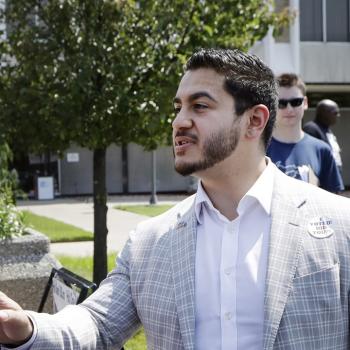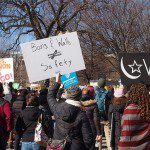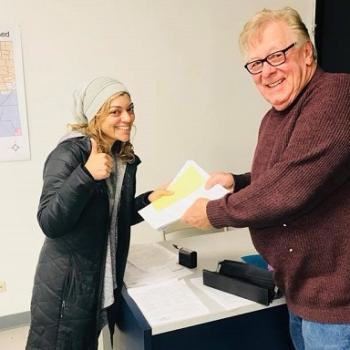 |
|
Victims and heroes
|
When acclaimed, Pulitzer-nominated author Dave Eggers (“A Heartbreaking Work of Staggering Genius”) heard about the Zeitouns, a Muslim family in New Orleans who were caught up in the chaos of Hurricane Katrina, he knew he had a uniquely American story that needed a greater voice. After Katrina struck, Abdulrahman Zeitoun, a Syrian-American father of four, travelled the flooded streets in an old canoe to help out his fellow neighbors. But when Abdulrahman went missing on September 6, 2005, many – including his wife Kathy – expected the worst. Relief came to the Zeitoun family with the news that Abdulrahman was still alive – but imprisoned unjustly as a suspected terrorist. After news of Abdulrahman’s incarceration and subsequent release became more widely known, Eggers spent three years interviewing and researching the family across the US, Spain, and Syria – the results of which can be seen in his new book Zeitoun. Here, Abdulrahman and Kathy Zeitoun speak to altmuslim exclusively to tell how they reacted both to Hurricane Katrina and Abdelrahman’s arrest, their dedication to their neighbours and New Orleans, and the establishment of the Zeitoun Foundation to help with the ongoing reconstruction of their city.
![]() Can you paint a picture of your life in New Orleans before Katrina? Explain to us what happened in the days after Katrina. In the book, you and the children left town, but your husband stayed behind to look after your business and help your neighbors. What happened to him?
Can you paint a picture of your life in New Orleans before Katrina? Explain to us what happened in the days after Katrina. In the book, you and the children left town, but your husband stayed behind to look after your business and help your neighbors. What happened to him?
[Kathy] My husband and I own two businesses, a painting contracting business and a rental property business, and we have five kids. Our lives were very busy at the time, alhamdulillah – we just live to work and work to live.
I was at my family’s house in Baton Rouge, and we would keep in touch [by cellphone], but over time it died. However, he found a phone in one of our [apartments] that was working because it was above the water – subhanallah how that phone was still working when everybody else didn’t have one. He would call me and we would talk 2-3 times throughout the day. One day – on the 6th – he said he would call around 12, but we lost contact. He was going to see one of our client’s houses that lived over on North Kagan – they were very good clients and were like family. He went, but he never called me back. Our daughter just turned five – she was the one who was closest to her daddy, and she was affected the most She wouldn’t eat, and she lost a lot of weight.
But even after all of this, and after everything that happened to him, we feel truly blessed because worse things happened to other people, and at least we can tell our story.
![]() Describe to me being a Muslim in that community. Have you experienced any difficulties?
Describe to me being a Muslim in that community. Have you experienced any difficulties?
[Kathy] Most times people are very pleasant to me, but there have been instances where people were not nice. But if I show a strong front, then people will think twice before they [harass me]. Most people are just looking [at my hijab], so I just smile and say, “How are you?” I just think that laughter is the best medicine that anyone could ever have. If you can find any humor in any situation, then you’re good to go. I feel that when I wear hijab, it gives me strength to deal with certain situations. After 9/11, a lot of women at my kids’ school took off their hijabs, and I was the only one in my whole area that wore hijab for a long time, but I refused to take it off. I think I never wore it with as much pride as after 9/11, because I knew the difference.
![]() When your husband disappeared in the wake of Katrina, what was going through your mind?
When your husband disappeared in the wake of Katrina, what was going through your mind?
[Kathy] I was my worst enemy and my best friend at the same time. One side of me was saying that he was shot, and the other side was saying that the phone probably went out, or that they took him from the city and shipped him to another state [for his safety]. But after you don’t hear anything for a couple of weeks, then the bad side starts winning. I was a nervous wreck. I didn’t want to think he was dead, but at the same time I started thinking, “What am I going to do with my kids? How am I going to get through this?” Of course, with Allah’s mercy, there’s always a way.
![]() How long was it between his disappearance and the time you found him again and what happened after you found out he was still alive? How did he get back home again?
How long was it between his disappearance and the time you found him again and what happened after you found out he was still alive? How did he get back home again?
[Kathy] It was between September 6th until about a week before he was released.
When we found out he was in prison, another hurricane was about to hit. I told my sister, “Alhamdullillah, at least I don’t have to worry about the hurricane – he’s safe, he’s in prison.” I wanted to take a plane and come back [from Arizona], but [the people I was staying with] were telling me, “You can’t just jump on a plane – you need to think this through, you have kids, there’s no rental cards, and you’re in no condition to drive.” Also, my husband’s family would call me constantly – all they knew was what they saw on television, so they think that this is what our city is like on an average day. But they were worried about their son, and the worst thing you can tell someone who is looking for their family is that you don’t know where they are.
![]() How did you begin the process of rebuilding your life after he came home? How has this experience affected your children?
How did you begin the process of rebuilding your life after he came home? How has this experience affected your children?
[Kathy] It’s funny – we own so many properties, but we were homeless. We stayed in one of our studio apartments that was rented out, until this guy came back to get his things – he didn’t mind if we were staying there. My husband was in prison for so long, we lost all of our [contracting] crew – we had to start from scratch again.
I think [our children are] more sheltered now. They don’t like to leave home. Before Katrina, each one slept in their own room. Now, we wake up in the middle of the night and we have kids all over the floor and bed. It’s just going to take some more healing time, I guess. Each time there’s a storm, they worry.
![]() How has the experience changed your relationship with New Orleans?
How has the experience changed your relationship with New Orleans?
[Kathy] I never tried to feel that people are going to do wrong by me. We are truly blessed to have the neighbors that we have. When I’m sick, my neighbors bring me food – these are the kinds of neighbors we have. Everyone looks out for everybody. There was one incident where this guy thought we were going to lower the value of the neighborhood. I fixed that problem right away – I got some more Muslims to move into the neighborhood! [laughter] If I’m going to degrade it, I’m going to degrade it really good! [laughter]
![]() Given all that you’ve been through – the detention, and the devastation around you, why stay in New Orleans?
Given all that you’ve been through – the detention, and the devastation around you, why stay in New Orleans?
[Kathy] Well, it’s our home, and it’s where we started. Whenever we travel, [at some point we say], “Let’s go home now.” We have a great rapport with our clients and tenants. Our friends and neighbors are still here, and we’re truly blessed.
[Abdelrahman] Part of my family are home builders, and part of them are in the seafaring business. So I have experience in both. I had a rough experience with the sea, but back in Syria, there is a saying – “who rides the sea isn’t afraid of drowning.” I feel that I can do things here if I stay behind. The Prophet [pbuh] encouraged us learn the rough life, because luxuries are with Allah. We don’t always have hot water or air conditioning. Sometimes things happen, and we shouldn’t feel hopeless. We need to know how to survive tragedy.
![]() How did your story make it’s way from your personal experience to a major book?
How did your story make it’s way from your personal experience to a major book?
[Kathy] After my husband got out of jail, we went to Camp Greyhound. A reporter came up and started speaking to my husband, and the lady [in charge] told the reporter, “I don’t want you talking to that man because he just got out of prison.” I found my voice through all of this. I wasn’t as vocal before, but this time I thought there was a need to defend my husband. This story getting out, it is definitely because of Allah’s mercy.
One of our clients, a lawyer who we’ve done work for years, I told him the story, and he said, “Kathy, put it down on paper, no matter how tedious.” It was hard getting the information from my husband, because he was humiliated and embarrassed. I would try to sweet talk him – “Ya, habibi, I got you some tea – now tell me the story.” I would just nag him to death until I got the story. I sent it to the lawyer, and eventually it found its way to the paper, and then Voices of Witness put it in a book.
Then Dave Eggers contacted us – at first we were very skeptical. We had never heard of him before, and we were worried about backlash. We got to know him very well, and he bonded with my husband. He got him to talk about things he wouldn’t talk about with me.
[Abdelrahman] I feel that Allah sent [Dave] from the sky to write this story. I never dreamed that someone would write a book about me or my experiences.
![]() In light of your experience, you’ve created the Zeitoun Foundation. Tell us about what you hope to accomplish with it.
In light of your experience, you’ve created the Zeitoun Foundation. Tell us about what you hope to accomplish with it.
[Kathy] The majority of the profits from the book will be going to fund the Zeitoun Foundation. It was a very good idea from Dave Eggers, because he has done several foundations before. He felt [it would be an extension of] our reputation for being generous and helping people. You never know when you’re going to need Allah’s help, so you want to help people who are in need. When I talk to people about the book, I tell them that you’re not just buying the book, you’re donating to charity. You’re helping to rebuild the city, and you’re donating to Muslim organizations as well.
![]() Did that help carry you through? That you give so much that you’d be taken care of?
Did that help carry you through? That you give so much that you’d be taken care of?
[Kathy] I remember asking Allah to get me through it. I would be laying in bed trying to sleep asking Him to keep him alive.
![]() You are a great example to other Muslims because you’re involved in the community around you, working to rebuild it. What advice do you have for other Muslims?
You are a great example to other Muslims because you’re involved in the community around you, working to rebuild it. What advice do you have for other Muslims?
[Kathy] There are two ways you can take things – you can be angry about it and let it build up, or you can find the humor in it. I used to be in charge of everything that happened in my house, and Katrina took all that control away. So then I had to realize that I wasn’t in control of anything. I was just blessed to be able to do the things I did. Everything happens by Allah’s will, you can’t change it. If this is a test, I’m sure I failed a large part of it, but I think my husband did pretty good.
![]() You both have been involved in building New Orleans both before and after Katrina – your mark is literally all over the place. How well has New Orleans recovered since Katrina?
You both have been involved in building New Orleans both before and after Katrina – your mark is literally all over the place. How well has New Orleans recovered since Katrina?
[Kathy] When we first came back, most of the houses were vacant. It was like a ghost town. Most places are rebuilding – slowly, perhaps, but rebuilding.
[Abdelrahman] I’d say it is about 60-70% rebuilt.
![]() Were you surprised at what happened to you when you were detained, or did you think that in a post 9/11 world that is was possible?
Were you surprised at what happened to you when you were detained, or did you think that in a post 9/11 world that is was possible?
[Abdelrahman] When I got out of my house after Katrina, I felt like i was in a Third World country. I went to check up on my properties, and I saw nobody offering any help.
![]() Has your experience made you less trusting of people?
Has your experience made you less trusting of people?
[Abdelrahman] No, it made me stronger. I feel that I have done something that everyone should do. I first had an intention to check on my houses, not to help anyone – I thought everyone left. I started seeing people, and helped where I could. One woman [stuck in her house] broke my heart – it was like seeing my grandmother with water up to her shoulders. People die if you don’t get to them. I felt so sad for her, but I also felt happy that I was able to help her.
![]() What do you hope people will take from your story?
What do you hope people will take from your story?
[Abdelrahman] [Recites sura from Qur’an] I feel what happened to me, on one side, Allah gave me a chance to help rescue some people, and on the other side, He put me in jail to protect me from harm. I feel that both were a blessing.
When I first came to America, I got a car and would pass by people on the street. I saw someone pushing his car, so I got out of my car and offered to help push. I asked, “Where do you want the car to go?” He said, “I’m just exercising!” He told me, “We need a few good people like you.”
Each person can help, no matter what – with your money, your position, your power. This is how Islam went everywhere – not with money or power, but with this attitude. Muslims are brought up with this [positive] attitude, and we should use it.
![]() What do you hope to do with the Zeitoun Foundation?
What do you hope to do with the Zeitoun Foundation?
[Abdelrahman] The Muslim ummah is always in trouble. Thank God we have everything we need. Back in Syria, they say “one stone supports mountains.” Sometimes, when you spend one dollar, you can save one life.
Shahed Amanullah is Editor-in-Chief of altmuslim.com.











